Poll: MAHA
This Navigator Research report covers perceptions of health and wellness policies in the United States and message guidance to meet the moment.
As we explored in the first report on the “Make America Healthy Again” (MAHA) movement, Americans across the political spectrum share a wide range of values on health and wellness. This is borne out in their agreement on certain policies and the role of government in advancing health and wellness.
The Policies
There is overwhelming bi-partisan support for health and wellness policies that seek to make health insurance cover preventative care, increase exercise and physical activity in school, remove highly processed foods from schools and artificial food dyes from all foods, hold corporations who pollute accountable, and use federal funds to invest in medical research.
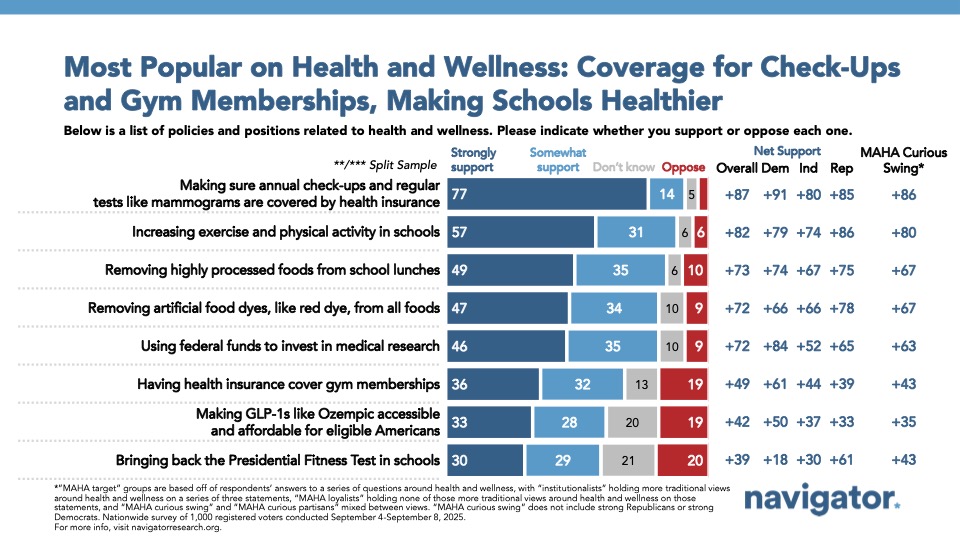
Other popular policies include banning “forever chemicals” from drinking water, decreasing pesticide and herbicide use in commercial agriculture, having health insurance cover gym memberships, making GLP-1s like Ozempic accessible and affordable for eligible Americans, and bringing back the Presidential Fitness Test in schools.
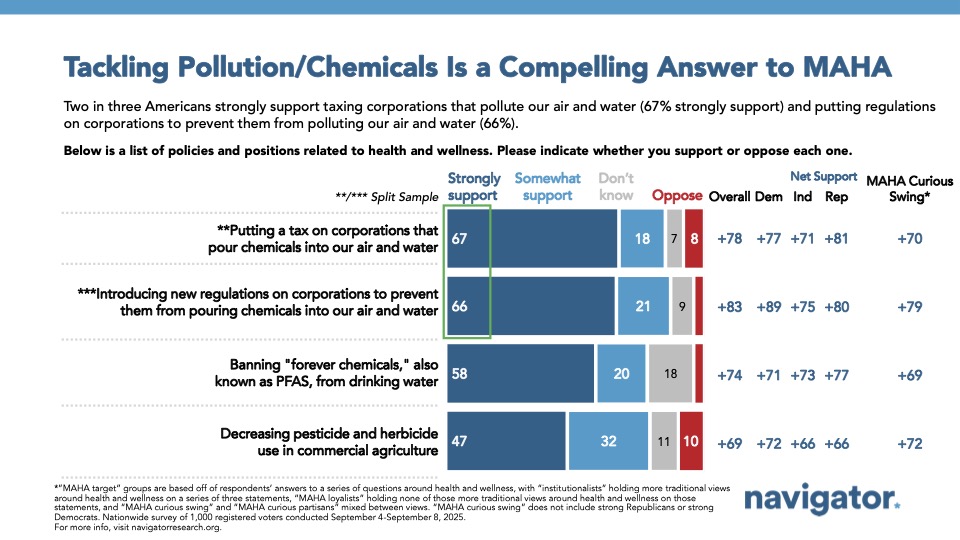
Less popular and more partisan are eliminating fluoride from public drinking water (43 percent support) and defunding mRNA vaccine research (just 26 percent support). These policies receive the most support among the MAHA loyalist cohort.
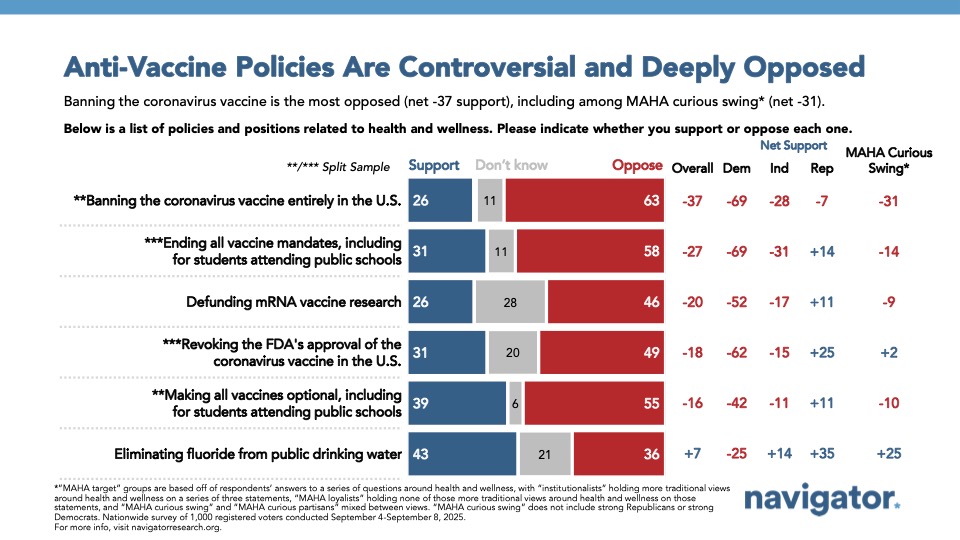
Anti-vaccine policies are the most controversial and opposed: a majority of Americans oppose making all vaccines optional, including for students attending public schools, ending all vaccine mandates, and banning the coronavirus vaccine entirely in the U.S.
The “MAHA curious” cohort are more divided than the overall electorate, but still more oppose ending all vaccine mandates, making all vaccines optional, and banning the coronavirus vaccine.
Vaccines
Actions to remove vaccine mandates for children are opposed by most, including those who are MAHA curious. Changes to childhood vaccine mandates in Florida draw fervent opposition (63 percent oppose), including among independents (60 percent) and the MAHA curious (54 percent). These sweeping changes outright divide Republicans (46 percent support – 44 percent oppose).
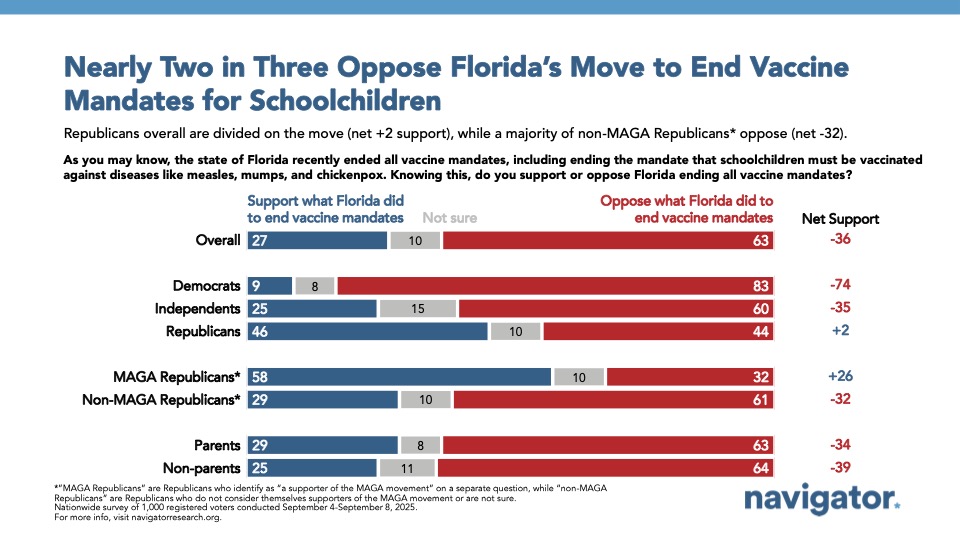
The anti-vaccine movement is viewed overwhelmingly negatively across party lines (-41), including by Republicans (-7), the MAHA curious (-31), independents (-44), and Democrats (-72).
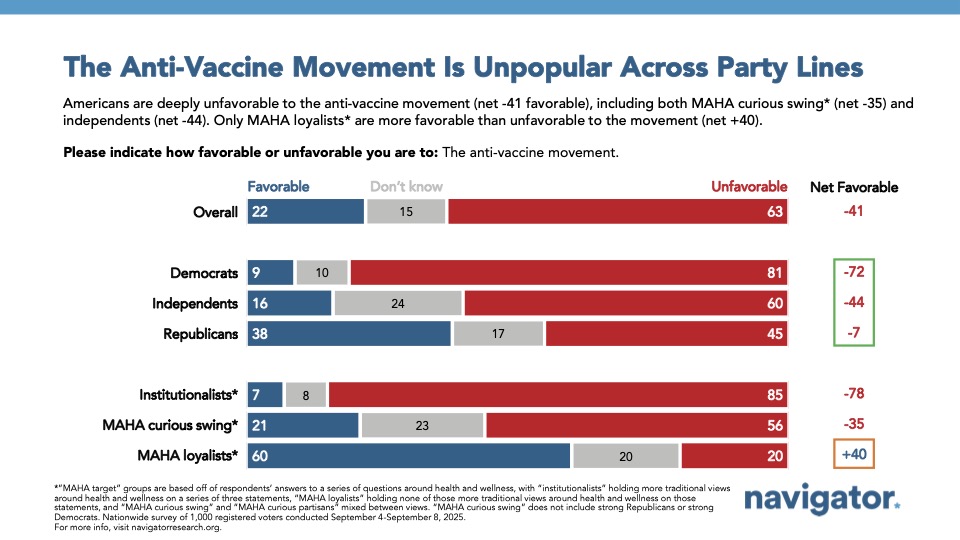
Bipartisan majorities of Americans identify generally as “pro-vaccine” (68 percent) over “anti-vaccine” (20 percent). 12 percent say they are neither pro-vaccine nor anti-vaccine, including 21 percent of the MAHA curious.
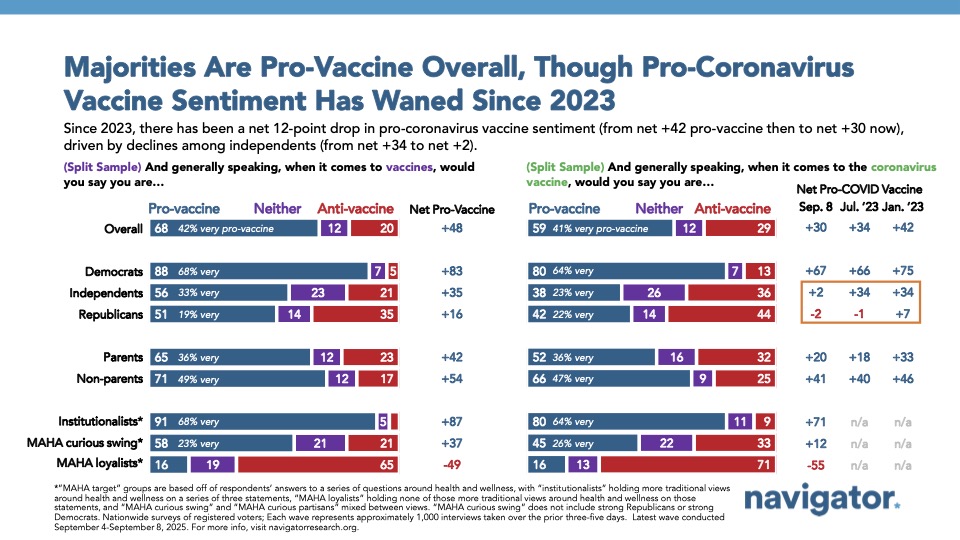
The coronavirus vaccine is where we find the most division. Americans overwhelmingly view the measles vaccine favorably (+66), including the MAHA curious (+49). By comparison, the coronavirus vaccine is viewed favorably by 11 points, and underwater among the MAHA curious (-18).
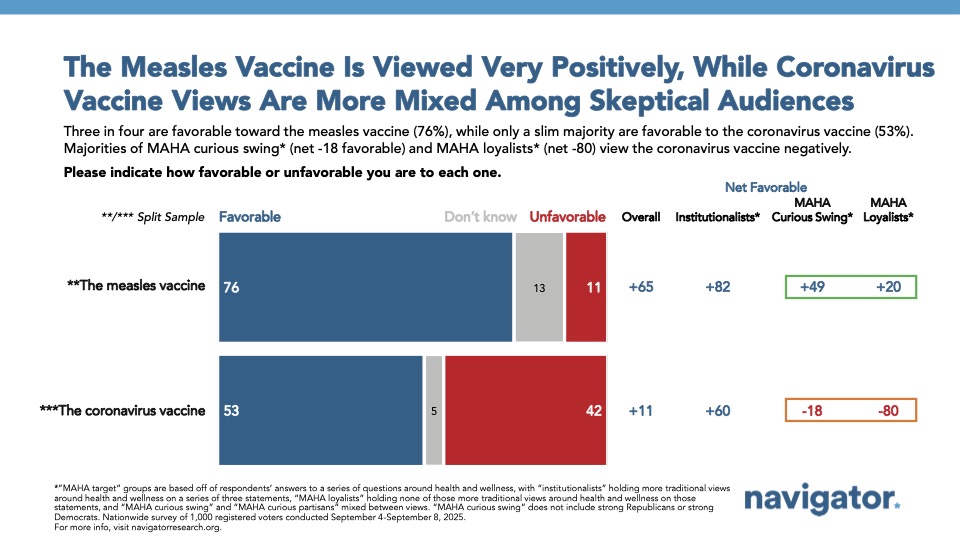
And when it comes to the coronavirus vaccine in particular, we see a 10-point drop in those who identify as pro-vaccine (59 percent), increasing anti-vaccine identification among both independents and Republicans and the MAHA curious.
A reminder that the MAHA curious group is deeply unfavorable to the anti-vaccine movement, oppose ending all vaccine mandates and the changes to vaccine mandates in Florida, and identify as “pro-vaccine” generally. All of this begs the question; how much of this is a COVID hangover or something that will have a lasting impact on public health and trust in vaccines?
Messaging to Meet the Moment
A message that addresses the faults in our health care system and focuses on cracking down on corporate interests is the best lane for progressives, including with MAHA curious Americans. In response to the conservative message that:
We need to get the government and corporate special interests out of the business of telling us what we should put in our bodies. Whether it’s vaccines, food additives, or toxins in the ground, Americans are better off doing their own research rather than listening to the so-called “experts” who put their own bottom line first.
We found the most persuasive response to be a message that acknowledge our health care system is broken, refutes the GOP solution, and provides an alternative, in particular cracking down on special interest influence:
Our health care system is broken, but the answer is not to cut medical research, take away healthy school meal options from kids, or limit vaccines. Instead we should be cracking down on special interest influence in our government and putting science and facts ahead of politics
Six in ten agree more with the latter, including the MAHA curious and independents. A version of the same message that concedes that “for too long, corporations have had too much power over our food and health care” is similarly effective.
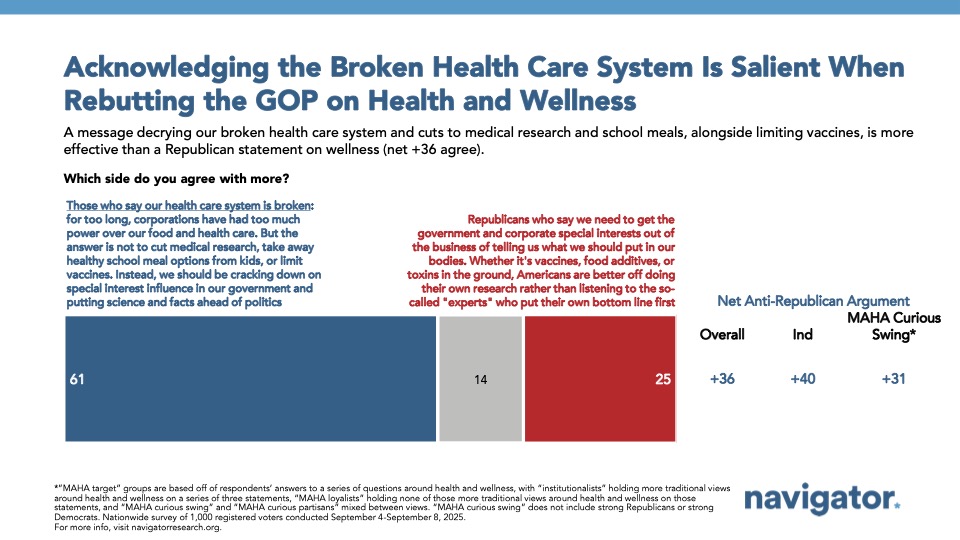
The most persuasive hit on Republican policies emphasizes cuts to Medicaid and school meals, as well as cuts to government-funded disease research.
Republicans are cutting crucial health and wellness programs. They’ve cut Medicaid, taken away free healthy school meal options from kids, and made massive cuts to lifesaving research into diseases like cancer and Alzheimer’s. None of this makes America healthier
Messages that solely take on corporate polluters, focus only on big corporations, and the idea that Republicans are trusting the wrong people for public health advice, are convincing to the institutionalists, but are far less convincing to MAHA curious audiences.
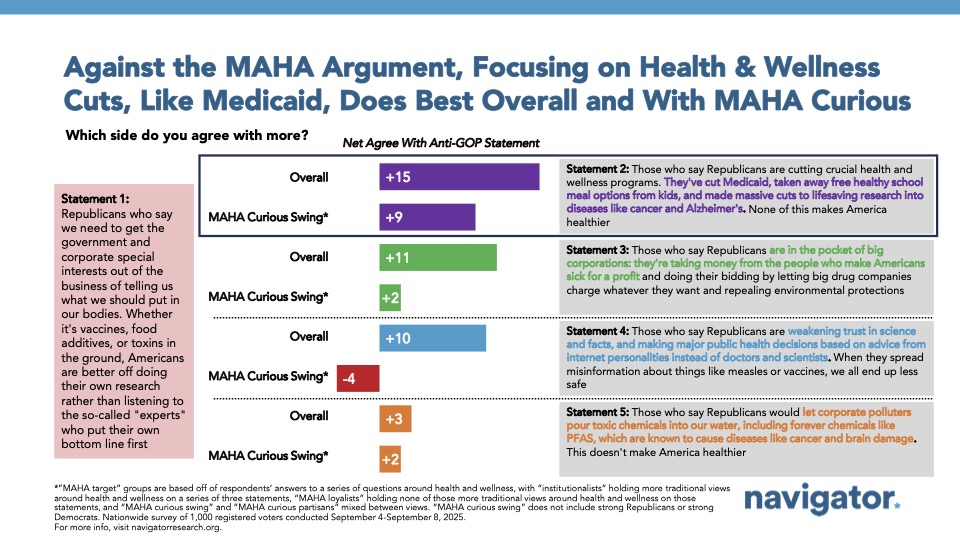
Recommendations:
- Acknowledge the system is broken: Most Americans are not satisfied with, or confident in, the existing health care system.
- Point out that the proposed solution is not right: Americans oppose cuts to medical research, taking away healthy school meals from kids, and ending all vaccine mandates.
- Provide an alternative: Cracking down on special interest influence in our government is particularly persuasive when talking about health and wellness in the country today.
